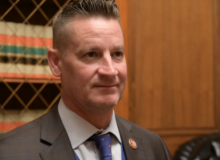Note: A different version of this ran as an official editorial of the Washington Examiner on Dec. 5, here. What follows is a version with a very slightly different focus.
House Intelligence Committee Chairman Adam Schiff owes the public some answers.
Schiff should explain why and under what authority he obtained and then publicized phone records that included calls involving presidential attorney Rudy Giuliani, ranking Intelligence Committee Republican Devin Nunes, reporter John Solomon, and others. It is far from clear when or even whether House subpoena powers extend so far without a court-ordered search warrant.
Schiff used the records to suggest attempts by the Trump team and by Schiff’s rival, Nunes, to coordinate an improper pressure campaign against Ukraine for the president’s personal, political benefit. Solomon, meanwhile, has been the conduit for much of the reporting, some of it from dubious sources, cited by Trump’s defenders as reason for Trump to want Ukrainian actions investigated.
The exact scope of congressional subpoena power is a legal gray frequently fought in the courts, without clear resolution. In Schiff’s favor, Congress’ reach is arguably at its zenith during impeachment proceedings. Plus, as Giuliani and his associate Lev Parnas are both reportedly under investigation by divisions of the U.S. Justice Department, it is possible Schiff was somehow piggybacking on those investigations to secure their phone logs. It does not appear, at first glance, as if he targeted Nunes or Solomon directly, as the only calls of theirs whose existence he reports are ones where they connected with Giuliani or Parnas.
In short, there may be legitimate reason, and legal standing, for Schiff to have secured the records. Even if so, however, those arguments in favor are debatable, and fraught with constitutional danger.

Fourth Amendment protections against unreasonable searches and seizures generally require executive branch officials (prosecutors or police) securing permission from judges or magistrates. In other words, the “checks and balances” of the system require two branches, not just one, to agree that the search is necessary and lawful. If Congress, meaning Schiff, acted without judicial imprimatur, then the legitimacy of his phone-records search was certainly questionable, to say the least.
Meanwhile, if he did actually subpoena Solomon’s calls directly – again, that question is not entirely clear – that would also raise ultra-serious questions about violations of First Amendment press freedoms as well as the Fourth Amendment concerns. Schiff needs to clear up this particular question, of why Solomon’s calls were included in the dragnet, immediately.
The phone records certainly do make Trump’s associates look bad, and Schiff is correct that they strongly suggest Nunes should have recused himself from committee consideration of these matters. Still, unless Schiff offers solid legal justification for his search/subpoenas, the information from them should be inadmissible against Trump’s team if the Senate is asked to conduct a trial of the president.
In sum, Schiff owes the public absolute transparency here about his methods and legal justifications for them. Yes, his exercise of power may conceivably have been legitimate, but count us unconvinced. Absent a full and convincing explanation, the phone-records search was presumptively invalid.






